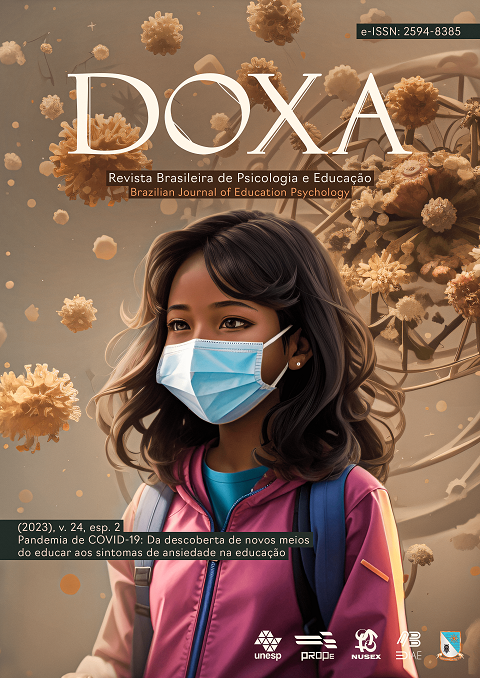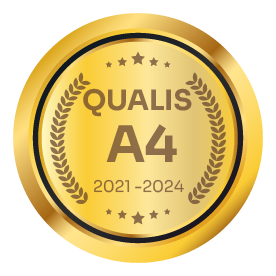Research report on education and pandemic in the South-Fluminense Region
DOI:
https://doi.org/10.30715/doxa.v24iesp.2.18640Keywords:
Education, Pandemic, Municipal Education Departments, South-Fluminense RegionAbstract
This work presents the results of a research study on the Impacts of the Pandemic on Education conducted by the Violence Observatory in 2021. The research aimed to understand how the scenario presented by the Coronavirus affected schools in the South-Fluminense Region and what managerial and pedagogical measures were taken. The research methodology used was a qualitative-quantitative approach. We had 61 respondents, who were school administrators, participating in an online questionnaire covering the following topics: interactions among the educational community, families, teachers, and students; the use of technological resources; the teaching, learning, and assessment process; and school meals. Some weaknesses were evident, including limited communication between the Education Department and schools in decision-making regarding the epidemic, difficulties in accessing the Internet and using online platforms, resulting in challenges in delivering lessons, a lack of technological infrastructure in the education departments, timid use of technical resources and new strategies for content development and learning assessment.
Downloads
References
ALPINO, T. M. A.; SANTOS, C. R. B.; BARROS, D. C.; FREITAS, C. M. COVID-19 e (in)segurança alimentar e nutricional: ações do Governo Federal brasileiro na pandemia frente aos desmontes orçamentários e institucionais. Cadernos de Saúde Pública, [S. l.], v. 36, n. 8, 2020. DOI: 10.1590/0102-311X00161320. Disponível em: https://www.scielo.br/j/csp/a/JfJpwMh9ZDrrsM9QG38VnBm/. Acesso em: 27 fev. 2022.
CENTRO DE INOVAÇÃO PARA A EDUCAÇÃO BRASILEIRA. Relatório Guia Edutec: Diagnóstico do Nível de Adoção de Tecnologia nas Escolas Públicas Brasileiras em 2022. São Paulo: CIEB, 2022.
PNUD; UNICEF; UNESCO; UNESCO. COVID-19 e desenvolvimento sustentável: avaliando a crise de olho na recuperação. Brasília, DF: PNUD, UNICEF, UNESCO, OPAS, 2021. Disponível em: https://www.unicef.org/brazil/media/16086/file. Acesso em: 20 fev. 2022.
GRUPO DE ESTUDOS SOBRE POLÍTICA EDUCACIONAL E TRABALHO DOCENTE (GESTRADO). Trabalho docente em tempos de pandemia: relatório técnico. Belo Horizonte: UFMG, 2021.
IPEA. Atlas da Violência. Brasília: IPEA, 2020. DOI: 10.38116.riatlasdaviolencia2020. Disponível em: https://www.ipea.gov.br/atlasviolencia/download/24/atlas-da-violencia-2020. Acesso em: 20 fev. 2022.
REDE PENSSAN. REDE BRASILEIRA DE PESQUISA EM SOBERANIA E SEGURANÇA ALIMENTAR E NUTRICIONAL. II Inquérito Nacional sobre Insegurança Alimentar no Contexto da Pandemia da Covid-19 no Brasil: II VIGISAN – relatório final. São Paulo: Fundação Friedrich Ebert, Rede PENSSAN, 2022. Disponível em: https://olheparaafome.com.br/wp-content/ uploads/2022/06/Relatorio-II-VIGISAN-2022.pdf. Acesso em: 23 ago. 2022.
Published
How to Cite
Issue
Section
License
Copyright (c) 2023 DOXA: Revista Brasileira de Psicologia e Educação

This work is licensed under a Creative Commons Attribution-NonCommercial-ShareAlike 4.0 International License.
Manuscritos aceitos e publicados são de propriedade da Doxa. É vedada a submissão integral ou parcial do manuscrito a qualquer outro periódico. A responsabilidade do conteúdo dos artigos é exclusiva dos autores. É vedada a tradução para outro idioma sem a autorização escrita do Editor ouvida a Comissão Editorial.










